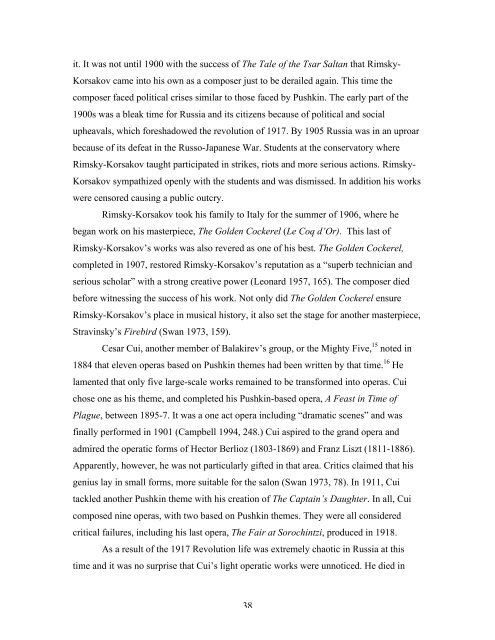Alexander Pushkin's Influence on Russian Ballet
Alexander Pushkin's Influence on Russian Ballet
Alexander Pushkin's Influence on Russian Ballet
You also want an ePaper? Increase the reach of your titles
YUMPU automatically turns print PDFs into web optimized ePapers that Google loves.
it. It was not until 1900 with the success of The Tale of the Tsar Saltan that Rimsky-<br />
Korsakov came into his own as a composer just to be derailed again. This time the<br />
composer faced political crises similar to those faced by Pushkin. The early part of the<br />
1900s was a bleak time for Russia and its citizens because of political and social<br />
upheavals, which foreshadowed the revoluti<strong>on</strong> of 1917. By 1905 Russia was in an uproar<br />
because of its defeat in the Russo-Japanese War. Students at the c<strong>on</strong>servatory where<br />
Rimsky-Korsakov taught participated in strikes, riots and more serious acti<strong>on</strong>s. Rimsky-<br />
Korsakov sympathized openly with the students and was dismissed. In additi<strong>on</strong> his works<br />
were censored causing a public outcry.<br />
Rimsky-Korsakov took his family to Italy for the summer of 1906, where he<br />
began work <strong>on</strong> his masterpiece, The Golden Cockerel (Le Coq d’Or). This last of<br />
Rimsky-Korsakov’s works was also revered as <strong>on</strong>e of his best. The Golden Cockerel,<br />
completed in 1907, restored Rimsky-Korsakov’s reputati<strong>on</strong> as a “superb technician and<br />
serious scholar” with a str<strong>on</strong>g creative power (Le<strong>on</strong>ard 1957, 165). The composer died<br />
before witnessing the success of his work. Not <strong>on</strong>ly did The Golden Cockerel ensure<br />
Rimsky-Korsakov’s place in musical history, it also set the stage for another masterpiece,<br />
Stravinsky’s Firebird (Swan 1973, 159).<br />
Cesar Cui, another member of Balakirev’s group, or the Mighty Five, 15 noted in<br />
1884 that eleven operas based <strong>on</strong> Pushkin themes had been written by that time. 16 He<br />
lamented that <strong>on</strong>ly five large-scale works remained to be transformed into operas. Cui<br />
chose <strong>on</strong>e as his theme, and completed his Pushkin-based opera, A Feast in Time of<br />
Plague, between 1895-7. It was a <strong>on</strong>e act opera including “dramatic scenes” and was<br />
finally performed in 1901 (Campbell 1994, 248.) Cui aspired to the grand opera and<br />
admired the operatic forms of Hector Berlioz (1803-1869) and Franz Liszt (1811-1886).<br />
Apparently, however, he was not particularly gifted in that area. Critics claimed that his<br />
genius lay in small forms, more suitable for the sal<strong>on</strong> (Swan 1973, 78). In 1911, Cui<br />
tackled another Pushkin theme with his creati<strong>on</strong> of The Captain’s Daughter. In all, Cui<br />
composed nine operas, with two based <strong>on</strong> Pushkin themes. They were all c<strong>on</strong>sidered<br />
critical failures, including his last opera, The Fair at Sorochintzi, produced in 1918.<br />
As a result of the 1917 Revoluti<strong>on</strong> life was extremely chaotic in Russia at this<br />
time and it was no surprise that Cui’s light operatic works were unnoticed. He died in<br />
38

















